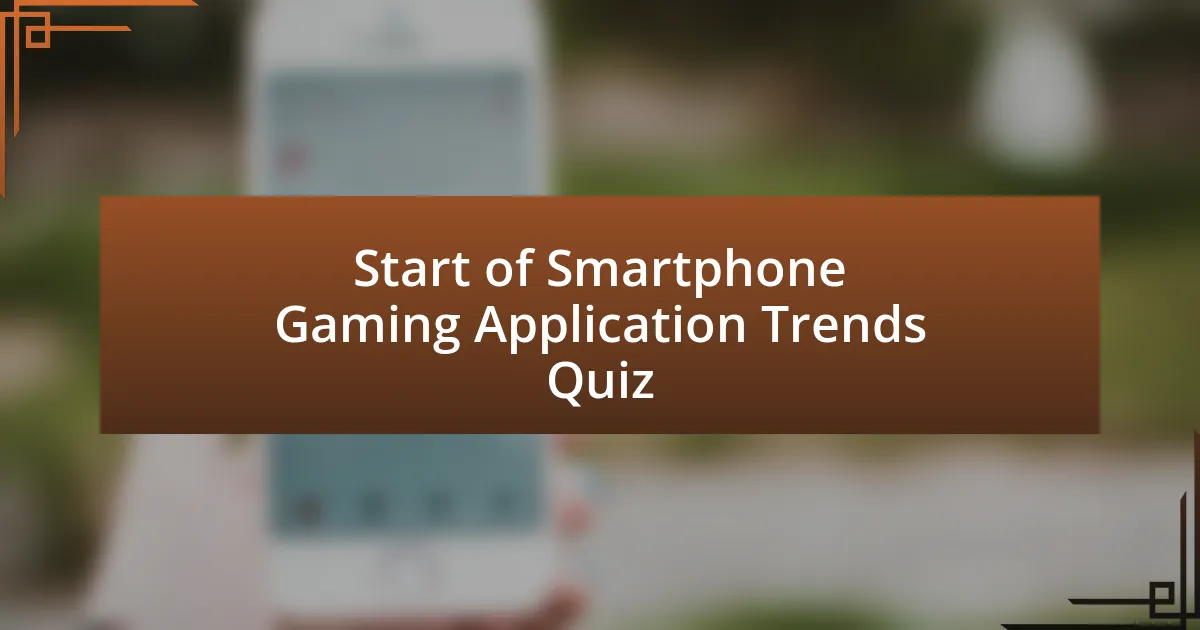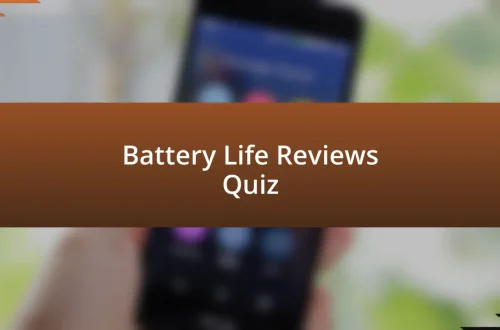
Smartphone Gaming Application Trends Quiz

Start of Smartphone Gaming Application Trends Quiz
1. What is the estimated size of the mobile gaming market in 2024?
- USD 200.00 billion
- USD 100.54 billion
- USD 75.20 billion
- USD 150.30 billion
2. What is the expected size of the mobile gaming market by 2029?
- USD 164.81 billion
- USD 200.00 billion
- USD 120.50 billion
- USD 90.30 billion
3. What is the CAGR of the mobile gaming market from 2024 to 2029?
- 9.75%
- 10.39%
- 12.50%
- 8.25%
4. What is driving the growth of the mobile gaming market?
- The decline in console gaming popularity due to high costs.
- The global surge in smartphone adoption, driven by their increasing availability and affordability.
- The rise of bulky gaming PCs that limit portability.
- The increase in traditional board game sales affecting mobile games.
5. How is the mobile gaming market expected to grow?
- The market is projected to decline at a rate of 5% annually until 2029.
- The market is forecasted to shrink to USD 80 billion by 2029.
- The market is expected to grow at a CAGR of 10.39% from 2024 to 2029.
- The market is expected to stagnate with no significant growth through 2029.
6. What impact does improved hardware in mobile devices have on gaming experiences?
- Improved hardware leads to less visual detail in games.
- Improved hardware creates compatibility issues with older games.
- Improved hardware decreases gameplay speed and responsiveness.
- Improved hardware has enabled richer and more immersive gaming experiences.
7. How has the evolution of mobile internet affected gaming?
- The evolution of mobile internet has made online gaming more difficult and slower.
- The evolution of mobile internet has decreased the quality of mobile games significantly.
- The evolution of mobile internet has had no impact on gaming at all.
- The evolution of mobile internet, especially with 4G and 5G, has paved the way for smooth online multiplayer gaming and faster game downloads.
8. What is the role of free-to-play games in the mobile gaming market?
- Free-to-play games do not offer monetization options.
- Free-to-play games are primarily for single-player experiences.
- Free-to-play games are funded solely by upfront costs.
- Free-to-play games drive market growth through in-app purchases.
9. How are social media platforms influencing mobile gaming?
- Social media platforms like Instagram and Facebook have started to build innovative mobile games to ensure high product differentiation and profit from engaging games to augment their overall advertisement strategies.
- Social media influences mobile gaming by only providing a platform for players to share their scores.
- Social media is primarily used for advertising hardware, not games.
- Social media platforms have no impact on the mobile gaming industry at all.
10. What is the impact of social media integration on mobile gaming?
- Social media integration has amplified engagement and community bonding within the mobile gaming sphere.
- Social media integration has decreased the overall quality of mobile games.
- Social media integration has reduced the need for in-game purchases.
- Social media integration has limited player interaction to offline modes only.
11. Which platforms have made it easier for developers to monetize and distribute their mobile games?
- Game consoles like PlayStation and Xbox
- Desktop software platforms like Steam and Origin
- App stores like Google Play and Apple`s App Store
- Social media networks like Twitter and LinkedIn
12. What role do smartphones play in facilitating social connectivity for gamers?
- Smartphones have no impact on social connectivity, as gamers prefer offline modes.
- Smartphones discourage social interactions by promoting single-player experiences.
- Smartphones facilitate social connectivity, enabling users to partake in multiplayer gaming with friends and a global player base.
- Smartphones limit social connectivity by restricting game access to solo players.
13. How is smartphone technology evolving to enhance gaming experiences?
- Smartphone technology is becoming less influential in gaming and focusing on basic functions.
- Smartphone technology is evolving at a quick pace, enhancing processing power and graphics and integrating virtual reality (VR).
- Smartphone technology is primarily focused on improving battery life, disregarding gaming enhancements.
- Smartphone technology is standardizing hardware to reduce gaming functionalities and experiences.
14. What is the significance of AR/VR in mobile gaming?
- AR/VR technologies have the potential to revolutionize the mobile gaming industry by offering immersive gaming experiences.
- AR/VR technologies have no impact on mobile gaming development.
- AR/VR technologies limit player interaction in mobile gaming.
- AR/VR technologies increase the cost of mobile games significantly.
15. What are some applications of AR in mobile gaming?
- AR enables virtual reality full immersion with headsets only.
- AR can transform the real world into a game interface, allowing for innovative gameplay that blends digital and physical spaces, such as treasure hunts, AR-enhanced navigation, and interactive storytelling.
- AR is primarily used for text-based adventure games in mobile apps.
- AR limits player interaction to single-player experiences only.
16. What is the future of VR in mobile gaming?
- VR technology is expected to be abandoned in favor of traditional gaming formats.
- VR is set to provide highly immersive gaming experiences in mobile games.
- VR will likely remain a niche market with limited growth in mobile gaming.
- VR will become the only type of gaming platform used for mobile games.
17. What are hybrid casual games?
- Hybrid casual games combine elements of casual and mid-core games, offering a more challenging and strategic experience than traditional casual games.
- Hybrid casual games are exclusively designed for competitive gaming with no casual elements.
- Hybrid casual games are single-player only without any social interaction features.
- Hybrid casual games are primarily focused on simple one-tap mechanics for quick play.
18. What are auto chess games?
- Auto chess games are single-player quests with no competition.
- Auto chess games involve players building a team of characters and battling against other players.
- Auto chess games are platformers resembling traditional board games.
- Auto chess games feature racing mechanics with car modifications.
19. What are idle games?
- Idle games are played exclusively in real-time with no progression.
- Idle games are played incrementally, with players collecting resources and making progress even when they are not actively playing.
- Idle games focus solely on competitive multiplayer gameplay.
- Idle games require constant attention and immediate responses for success.
20. Which genres are emerging in the mobile gaming market?
- Emerging genres include platformer games, educational games, and card games.
- Emerging genres include fighting games, rhythm games, and trivia games.
- Emerging genres include sports simulation games, racing games, and puzzle games.
- Emerging genres include hybrid casual games, auto chess games, and idle games.
21. How is the mobile gaming market expected to grow in terms of revenue?
- The mobile gaming market is expected to remain stagnant over the next five years.
- The mobile gaming market is expected to grow at an annual rate of 6.39% from 2024 to 2027.
- The mobile gaming market is expected to contract to $90 billion by 2027.
- The mobile gaming market is expected to decline by 2% by 2027.
22. What is the current revenue generated by the global mobile games market in 2024?
- USD 120.00 billion
- USD 75.30 billion
- USD 98.74 billion
- USD 85.50 billion
23. How has consumer spending on mobile gaming changed over the years?
- Consumer spending on mobile gaming decreased by 2% in 2023 compared to the previous year.
- Consumer spending on mobile gaming remained the same in 2023.
- Consumer spending on mobile gaming increased by 10% in 2023.
- Consumer spending on mobile gaming decreased by 5% in 2023.
24. What is the significance of the rise of indie games in the mobile gaming market?
- Indie games have made mobile gaming less popular among mainstream titles.
- Indie games have no impact on the growth of mobile gaming sales.
- Indie games focus solely on multiplayer experiences.
- The rise of indie games offers unique and engaging experiences that stand out from the crowd.
25. What is the importance of user acquisition in mobile gaming?
- User acquisition is only important for console gaming.
- User acquisition is crucial for mobile game developers to attract and retain players.
- User acquisition has no impact on player engagement.
- User acquisition helps in reducing game development costs.
26. How do live operations (LiveOps) influence mobile gaming?
- LiveOps focus solely on graphical enhancements without considering player feedback.
- LiveOps reduce the number of player interactions in games, limiting engagement.
- LiveOps are primarily concerned with fixing bugs and have little impact on gameplay.
- LiveOps continuously innovate to more effectively meet players’ needs, enhancing user engagement and retention.
27. What is the significance of AI-powered game development in mobile gaming?
- AI-powered game development limits creativity in game design and player interaction.
- AI-powered game development enhances game design and player experience through personalized interactions and adaptive gameplay.
- AI in game development focuses solely on graphics and visual effects.
- AI-powered game development has no significant impact on player engagement or gameplay.
28. What role does esports play in the mobile gaming market?
- Esports restricts the variety of games available in the mobile gaming market.
- Esports does not affect the mobile gaming market in any significant way.
- Esports has led to a decline in player engagement in the mobile gaming market.
- Esports has amplified engagement and community bonding within the mobile gaming sphere, particularly with the rise of mobile eSports.
29. How do subscription models influence mobile gaming?
- Subscription models increase game prices and reduce overall player participation.
- Subscription models offer a steady revenue stream for game developers, providing players with access to premium content and features.
- Subscription models limit player access to games and create barriers for new users.
- Subscription models only benefit larger companies, ignoring indie game developers.
30. What is the focus on player engagement in mobile gaming?
- The focus on player engagement eliminates any need for community interaction.
- The focus on player engagement focuses only on high monetization strategies.
- The focus on player engagement involves strategies to keep players engaged, such as regular updates, events, and personalized interactions.
- The focus on player engagement is solely about graphics and game design.

Congratulations! You’ve Successfully Completed the Quiz
Thank you for participating in our quiz on Smartphone Gaming Application Trends. We hope you found the experience both enjoyable and informative. Engaging with the questions has likely helped you understand the latest developments in the gaming industry, including popular genres, emerging technologies, and player preferences. Each answer contributed to a broader picture of how mobile gaming is evolving.
Throughout the quiz, you may have uncovered insights into how gaming applications adapt to changing market dynamics and user demands. You might have learned about the significance of user experience, monetization strategies, and the impact of social features on gameplay. This knowledge is essential as it equips you to better navigate the fast-paced world of mobile gaming.
If you’re eager to dive deeper into the intricacies of Smartphone Gaming Application Trends, we invite you to check out the next section on this page. It contains valuable information that expands on the quiz topics and offers further learning opportunities. Let’s continue exploring this exciting and continually evolving landscape together!

Smartphone Gaming Application Trends
Current Popularity of Smartphone Gaming Applications
Smartphone gaming applications have surged in popularity over the last decade. Factors include the increasing number of smartphone users and advancements in mobile technology. Games like “PUBG Mobile” and “Candy Crush Saga” exemplify this trend, attracting millions of players worldwide. Recent statistics indicate that mobile games account for nearly 50% of the global gaming market, reflecting a significant shift in how people engage with games.
Emerging Genres in Smartphone Gaming
New genres are continuously emerging in smartphone gaming, driven by player preferences and technological advancements. Battle Royale, Hyper-Casual, and Augmented Reality (AR) games are currently trending. For instance, AR games like “Pokémon GO” have created innovative experiences by integrating real-world locations with gameplay. This shift highlights players’ desires for novelty and interactive experiences.
Impact of In-Game Purchases and Monetization Strategies
In-game purchases have become a dominant monetization strategy for smartphone gaming applications. Players commonly engage with these purchases to enhance gameplay or access exclusive content. Games such as “Fortnite” and “Clash of Clans” exemplify successful integration of this model. The revenue generated from in-game purchases significantly surpasses initial game sales, emphasizing the strategy’s effectiveness in maximizing profits.
Integration of Social Features in Mobile Games
Social features are increasingly important in enhancing the player experience in smartphone games. Features such as multiplayer modes, leaderboards, and chat functions foster community engagement. Games like “Among Us” and “Call of Duty: Mobile” demonstrate how social interaction enhances player retention and satisfaction. This trend supports the notion that gaming has evolved into a social experience rather than just solitary entertainment.
Role of Artificial Intelligence in Game Development
Artificial Intelligence (AI) plays a critical role in the development of smartphone gaming applications. AI enhances gameplay by personalizing user experiences and improving game mechanics. For example, AI algorithms analyze player behavior to adjust difficulty levels in real-time. This not only keeps players engaged but also promotes longer play sessions, showcasing AI’s influence on the overall gaming experience.
What are the current trends in smartphone gaming applications?
Current trends in smartphone gaming applications include augmented reality (AR) integration, subscription-based gaming services, and the rise of hyper-casual games. AR has been popularized by games like Pokemon Go, enhancing gameplay experience. Subscription services like Xbox Game Pass and Apple Arcade are gaining traction, providing access to a wide variety of games for a monthly fee. Moreover, hyper-casual games lead the market due to their simple mechanics and easy accessibility, appealing to a broad audience.
How are in-app purchases influencing smartphone gaming?
In-app purchases significantly influence smartphone gaming by generating substantial revenue for developers. A report by Statista indicates that in-app purchase revenue made up approximately 74% of mobile game revenue in 2022. This model encourages ongoing engagement as players can buy new skins, upgrades, or game currency, which drives prolonged play and financial investment in free-to-play games.
Where can developers find tools and resources for creating smartphone games?
Developers can find tools and resources for creating smartphone games on platforms like Unity and Unreal Engine, both offering extensive documentation and community support. Additionally, websites such as GitHub and Stack Overflow serve as valuable resources for finding code samples and troubleshooting. These tools empower developers by providing accessible environments for game development.
When did the shift toward mobile gaming begin to accelerate?
The shift toward mobile gaming began to accelerate around 2010, coinciding with the launch of Apple’s App Store and the introduction of smartphones with advanced graphics capabilities. By 2015, mobile gaming had overtaken console gaming in revenue, as user accessibility and smartphone penetration increased. According to Newzoo, mobile gaming revenue was estimated to reach $116 billion in 2021, reflecting this significant trend.
Who are the leading companies in smartphone gaming applications?
Leading companies in smartphone gaming applications include Tencent, Activision Blizzard, and Supercell. Tencent dominates the market with a vast portfolio, including titles like Honor of Kings and PUBG Mobile. Activision Blizzard continues to thrive with popular franchises such as Call of Duty Mobile. Supercell is known for its successful games like Clash of Clans and Brawl Stars, emphasizing their strong influence in mobile gaming.



